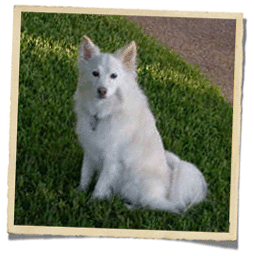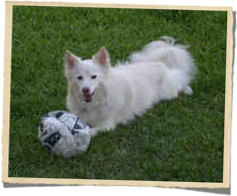
HOME
 YOUR HISTIO STORY
YOUR HISTIO STORY
I am looking for similarities
in all individual cases of
Histiocytic diseases.
I wonder if we all tell our
stories we might come up
with some commonality
between the specific
situations in which all of
our pets got this disease.
So please email me the
details and I'll put your
pets story on Shelley's
Histio Website
 UW HISTIO VERHAAL
UW HISTIO VERHAAL
Ik ben op zoek naar
overeenkomsten in alle
individuele gevallen van
Histiocytose.
Ik hoop dat wanneer wij
onze Histio verhalen
vertellen, wij overeen-
komsten ontdekken over
de manier waarop onze
huisdieren deze ziekte
hebben opgelopen.
Stuur mij de details en
ik zal het verhaal van uw
huisdier op de Histio
website van Shelley zetten.
 WARNING !
WARNING !
These stories are all
different. Individual
symptoms, situations
and circumstances
may vary and response to
therapy is not always the
same.
- Disclaimer -
 WAARSCHUWING !
WAARSCHUWING !
Deze verhalen zijn allemaal
verschillend. Individuele
symptomen, situaties en
omstandigheden kunnen
verschillen en de reactie
op therapie is niet altijd
hetzelfde.
- Disclaimer -
HISTIOCYTOSIS IN
OTHER LANGUAGES
German - Hund
Maligner Histiozytose
French - Chien
l'Histiocytose Maligne
Italian - Canis
Maligni Histiocytosis
Spanish - Perros
Histiocitosis Maligna
Dutch - Hond
Maligne Histiocytose
HOME
Max
Malignant Histiocytosis
American Eskimo
Male
May 27, 1992 - April 11, 2005


Well, our story begins much the way the other stories did. Max was 12 years old and was still going strong, other than a slipped disc in his neck that bothered him occasionally.
One morning in early May '04 he woke up in pain. I took him to the vet where they diagnosed him with a slipped disc (no x-rays were taken). The prescribed treatment was muscle relaxants and anti-inflammatories. That worked, but three weeks later the problem was back. Took him back to the vet; we were told slipped discs take time (sometimes months) to heal. We continued with the same drugs. About a month later the problem was back so we were told to remove all toys, to prevent him from shaking them and reinjuring himself, and to continue with the same drugs. We did that, but he was so sad. Every couple of months the pain would recur so we would treat with the muscle relaxants and anti-inflammatories then he'd be better.
In August of 2004 I thought I felt a lump on his throat area, but also at this time he didn't seem himself, he seemed depressed. I was pregnant with our second child and, as crazy as it sounds, wondered if he could somehow sense the pregnancy (he had a hard time adjusting after our first baby came home). I took him to the vet again, but of course the "lump" was gone so I convinced myself that I had just imagined it. I also asked about the depression. The doctor said dogs can get depressed when sick but that they don't really internalize feelings the way people do so, again, I convinced myself that I had just imagined it. But, to me, he still looked depressed so I just made sure I gave him lots of extra love and attention.
Our second baby was born in November 2004. About a week after the baby was home Max's neck began hurting again so I gave him the same course of treatment. Usually it would take about two days of treatment before he would feel better, but this time he was back to normal within one day after treatment so I figured he may have just been looking for a little extra attention.
On February 22, 2005 I took him in for routine blood work and everything was fine. While I was there I also mentioned a slight "snoring" sound he had started making. The doctor (not our normal doctor) listened to his chest but couldn't hear anything obvious; she said it could possibly be allergies but to keep an eye on it.
February 25th, I began treatment for the slipped disc again. Again, he would usually feel better after 1-2 days of treatment; however, three days later he was still in pain, then I noticed his throat. The entire front of his throat was swollen. Back to the vet we went. The doctor said it was edema and suspected some kind of allergic reaction. She treated him with an antihistamine and steroid, but he did not respond. She then suspected an infection and started him on an antibiotic. She took an x-ray of the throat area, but couldn't see anything obvious. She also did some additional blood work; liver enzymes were slightly elevated, but she said this wasn't unusual at his age.
 March 2nd, he still didn't seem himself. She took a chest x-ray, but didn't see anything obvious. She noticed one of his salivary glands was enlarged so she aspirated it for testing. She thought maybe he had been exposed to leptospirosis so we began giving him Amoxicillin (so now he was taking two antibiotics). Test results on salivary gland came back, but only said "cannot rule out cancer".
March 2nd, he still didn't seem himself. She took a chest x-ray, but didn't see anything obvious. She noticed one of his salivary glands was enlarged so she aspirated it for testing. She thought maybe he had been exposed to leptospirosis so we began giving him Amoxicillin (so now he was taking two antibiotics). Test results on salivary gland came back, but only said "cannot rule out cancer".
March 5th, throat swelling was completely gone and he actually seemed a little perkier.
March 6th, perkiness gone; now seems pretty lethargic.
March 7th, still lethargic and began making a slight coughing/wheezing sound. Did not eat his "breakfast" that morning, but did eat dinner. Doctor suspected antibiotics were beginning to upset his stomach and recommended we stop the meds for a day or two.
March 8th, still lethargic. As someone put a flier on our front door Max charged the door barking (as he always does). Suddenly he began panting extremely hard and fell down. He tried to get up, but fell down again. I ran over and held him for a minute until he calmed down, then he was "fine". I called the doctor; she suspected either a respiratory or neurological problem.
March 9th, took him back for a second chest x-ray; still didn't see anything, but he clearly didn't feel well.
March 11th, our doctor had been consulting with the other doctor in the office. When neither of them could figure it out they consulted a specialist. Based on the information they sent the specialist, she couldn't figure it out either. The symptoms could have been anything.
March 16th, took him back to check the salivary gland again. Gland looked fine; however, she noticed his tummy seemed a little distended and, as she looked in his mouth, noticed his gums were very pale. She suspected anemia (which might explain the passing out episode). More bloodwork. That night as I was petting him I noticed a good sized lump on the side of his neck. As much as I loved on this dog there's no way I would have missed a lump that size so it apparently developed very quickly.
March 17th, blood work came back confirming anemia. Our doctor was frustrated that she couldn't figure it out so she referred us to the specialty hospital who, fortunately, was able to get us in that day. I showed the specialist the lump and didn't get a good feeling when she said, "oh dear". They did an ultrasound and noticed the spleen and liver were enlarged. She then did a needle biopsy on both organs then biopsied the lump on his neck; as you might guess the diagnosis was malignant histiocytosis. We were told this hideous disease does not respond to treatment so they put him on Prednisone and sent us home. It was very hard for me to just accept a death sentence and wait for him to die so I scoured the internet for any information I could find, unfortunately it didn't tell me what I wanted to hear.
I let myself stay in denial for a few days, but once I accepted the news we did our best to make his remaining days happy days. It was so hard to watch my beautiful, strong dog deteriorate before my eyes. He lost muscle mass quickly so his shoulders, chest, and hips were very bony. His abdominal area continued to fill with fluid so he began to resemble a barrel with legs. He began having a harder time breathing and walking, then last Wednesday, April 6th, I happened to notice his back legs were very swollen. He also slipped on the tile floor a few times and couldn't get up. During this time, as crummy as he must have felt, he continued to follow me everywhere, as he always had. But on Friday, April 8th, he stopped getting up as much. I talked to the doctor and she said it sounded like it was about time: loss of muscle mass, labored breathing, edema, loss of appetite, overall weakness all signs of progression.
So on Saturday, April 9th, I arranged to take him in, then all of a sudden he got up, wagged his tail, and begged for some food. We decided that wasn't the right day so I canceled the appointment.
But Sunday, April 10th, he only got up one time that day. He looked so sad, just laid there starring off into space. We decided we needed to take him the following day. That night was the first night he had really struggled. We woke up around 2:00 a.m. and he was gasping for air. This went on for about an hour or so then he calmed down and was fairly quiet the rest of the night, but he couldn't get comfortable.
Monday, April 11th, he rejected both food and water, so I knew we were making the right decision. When we got to the vet he just laid there as the doctor administered the injection. It was very peaceful. As hard as it was to lose him, it was actually a relief to not see him struggle anymore.
We were told he had anywhere from two weeks to two months --- he made it 25 days after diagnosis. My doctor had never seen a case of MH and a vet friend of mine has only seen one case in 20 years. If this cancer is so rare then how are these good dogs getting it?
I mentioned the slipped disc and the depression at the beginning of this story. I now wonder if he ever had a slipped disc (since I found the lump on the side of his neck) and I wonder if the depression was my imagination or if he really was depressed because he was starting to have early symptoms of this disease. I'll never know, but I do know he was the most incredible dog I've ever seen, he was our buddy and we miss him terribly.
Cheryl and John Anderson

